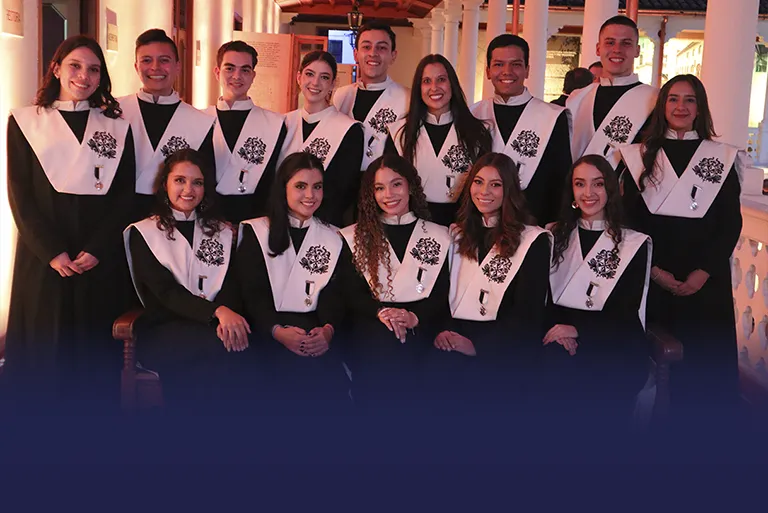

COLLEGIAL COUNCIL
COLLEGIAL COUNCIL
Collegians of Distinction: The Tradition of a Legacy
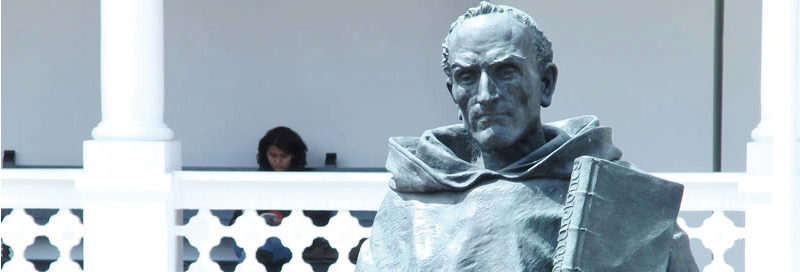
Collegians of Distinction: The Tradition Of A Legacy Being a Rosarista represents a set of qualities that have allowed us to stand out throughout history. We are one of the oldest universities in Colombia; we are autonomous, human, and critical of a society that needs someone to be. We elect our rector and our councilors, and we participate in the decisions that are made in an institution created by and for the students. We are the only university that has the right and duty to elect its institutional governing body; we represent that dose of rebelliousness that seems necessary in any established system. We are the result of a constant struggle kept alive by our founder: Friar Cristóbal de Torres. His strength, tenacity, and autonomy allowed us, and continue to allow us today, to be one of the most important educational institutions in Colombia and in Latin America.
Establishment of the Collegians: A Struggle Against Tradition
On December 18, 1653, the Archbishop of Santa Fe, Friar Cristóbal de Torres, founded the Colegio Mayor de Nuestra Señora del Rosario. This Spanish Dominican, renowned for his studies in Theology, his teaching vocation, and the reforming strength with which he lived, proposed to create an educational institution that differed from the two prominent ones in the New Kingdom of Granada: the Universidad Santo Tomás and the Pontificia Universidad Javeriana. His college soon became the most prestigious university in the New Kingdom.
In a departure from the norm, Friar Cristóbal established his college with the idea that fifteen students would be in charge of electing the rector. This decision led to conflicts with his Dominican peers, who, with the power that King Philip IV granted them, led many social and educational institutions of the time. They did not want the new college to be different.
It took several years of seeking permissions, agreements, conciliations, and courses of action so that Archbishop Friar Cristóbal’s model, inspired by institutions like the University of Bologna or the University of Salamanca, would be accepted within the established system of the time. Ten years later, King Philip IV ruled in favor of the Rosario. An archbishop, with his resources, had created a college directed, governed, and organized by its own students. The governance system was led by fifteen students who lived in the Cloister. They elected the rector and councilors at regular intervals, who would become the members of the board responsible for managing resources. Thus, the Colegio Mayor de Nuestra Señora del Rosario was established.
Similarly, our founder proposed that the patron of the institution should be the current archbishop leading the Church. When the archbishop changed, so would the patron of the Rosario. However, it was the king who was designated this role within the Cloister. The patron is a figure that exists to protect an institution, to assess if it is working well, and to provide help if necessary. This would change during the time of independence. During the founding of the Republic, the liberator Simón Bolívar proposed that all the patrons, previously headed by the king (and several institutions followed this model), would now be assumed by the President of the Republic, as this figure replaced the king. The President of the Republic thus became the patron of the Colegio Mayor de Nuestra Señora del Rosario.
Years later, the Universidad del Rosario continued to lead the country with its autonomy, academic excellence, and institutional dedication. Thus, the spirit and status of the Rosario began to set it apart from all other universities, allowing it to persist throughout the entire period of Spanish rule.
Collegians: A Crucial Role
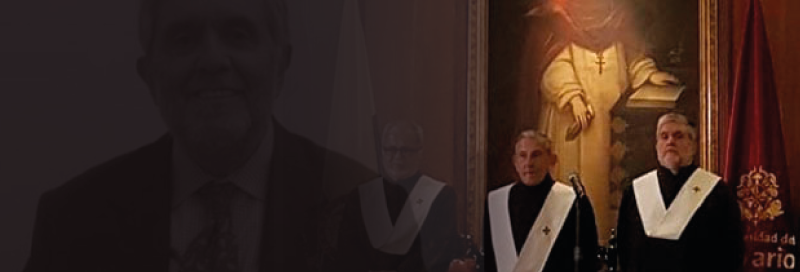
Dr. Luis Enrique Nieto, Director of the Cultural and Historical Heritage Unit at the Universidad del Rosario, describes the Collegial Council as follows: “Collegians actively participate in university life. They elect the rector and the councilors. They have the responsibility of preserving a legacy and choosing their institutional government, something that does not happen in any other university in the country. Any achievement of the institution is, in part, the work of the Collegians”.
Collegians shoulder significant responsibility when taking on this role. They form a governing body with the authority to elect both the rector and the councilors. Additionally, since 2005, the Resident Assistant has been a part of the Board of Councilors, with both a voice and a vote. Today, and for several years now, collegians have actively participated in the Academic Councils of faculties and schools, as well as in many institutional committees, such as the Scholarship Committee. Over the years, collegians have increasingly made their presence felt in the academic bodies and units of the University.
The Collegial Council is a perfect example of student participation. It is worth highlighting the distinctive qualities of Collegians of Distinction, which embody the Rosarista hallmark: a sense of responsibility and great confidence in our youth.
Selection Process: Leadership and Conduct
In order to select Collegians of Distinction, each school and faculty prepares and publishes lists of students who rank within the top third in terms of academic performance and have completed at least four academic terms in their respective programs. These students must fill out the resume format so that their academic unit can pre-select a group of candidates to be interviewed by the respective academic council. Afterwards, they sit a psycho-technical test.
Once the interviews of the pre-selected students have taken place, the academic council of each faculty or school, with the presence of the rector or their delegate, the dean, representatives of the professors, alumni, the Student Council, and the Collegians themselves choose a specific number to proceed to the final interview with the Board of Councilors. The Board of Councilors, chaired by the rector, is responsible for selecting the fifteen Collegians, who must be confirmed by the President of the Republic in his capacity as the patron of the Cloister.
The fifteen students who currently constitute the Collegial Council, coming from various undergraduate programs, are selected based on their outstanding moral and behavioral qualities, as well as their exceptional leadership abilities.
El Rosario, with the Collegial Council body, demonstrates that it has always been and will continue to be an institution of and for the students. Brimming with ideas, autonomy, voice, and humanity, our students actively participate in shaping the University where they experience some of the best years of their lives. The University educates and instills them with a strong sense of service to the common good, with the Rosarista hallmark and values.
REQUIREMENTS

While all undergraduate students may aspire to be Collegians, the Constitutions stipulate that to be a Collegian, applicants must:
Meet high moral and behavioral standards
Have completed at least two consecutive years of continuous study at the Universidad del Rosario
Rank in the top third of their course in terms of academic performance
Following a rigorous selection process conducted by the academic councils of the various faculties and schools, the Collegians required to fill the fifteen positions mandated by the university's governing body are chosen by the Rector and the Councilors together. The institution of the Collegial Council holds great significance in the university life of Rosarita students, as it is the students who govern the University, bringing forth fresh and innovative ideas, along with new goals to achieve. By becoming Collegians of Distinction, students receive an honor that will accompany them throughout their lives. After completing their undergraduate studies, they transition from Collegians of Distinction to simply Collegians, as this recognition is lifelong.
In addition, Collegians of Distinction enjoy a full scholarship for the remainder of the academic program for which they were selected, and receive additional benefits such as exemption from graduation fees and the opportunity to have a private graduation ceremony in the Main Hall of the University Cloister.
RESPONSIBILITIES
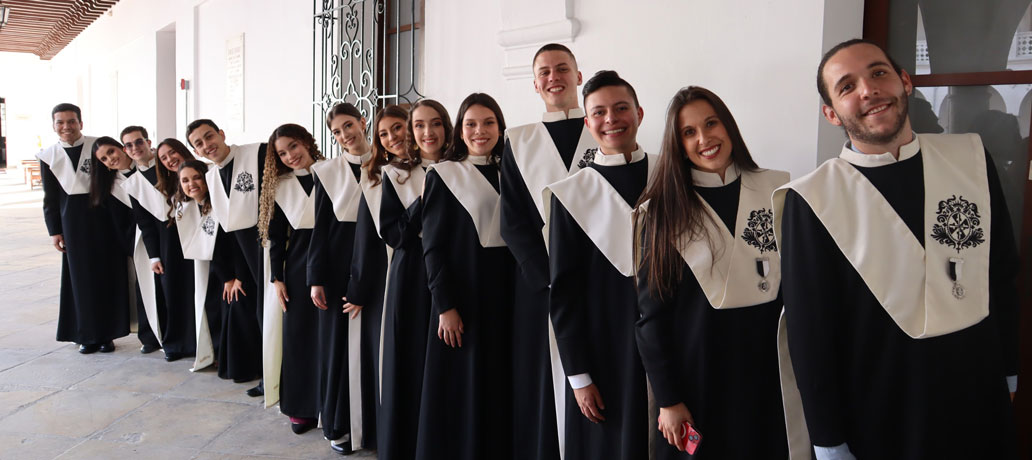
It is important to highlight that the primary responsibility of these young Universidad del Rosario students is the election of the Rector and the Councilors. Collegians of Distinction, together with the Councilors, form the Electoral College of the Rector; and, in turn, the Collegians of Distinction and the Rector form the Electoral College of the Councilors.
Among the various roles and duties of Collegians of Distinction are:
To uphold the qualities and virtues for which they were chosen.
To maintain their academic excellence and responsibility.
To fulfill the oaths taken on the day of their consecration as Collegians.
To participate in the Academic Councils of each faculty.
To develop projects for the benefit of students and institutional strengthening.
To strengthen the Rosarista community.
To consolidate economic support and incentive policies.
Enhancing discussions and actions for the formation of a better: University and country.
COLEGIALES ELECTOS

ALEJANDRA CONTRERAS CARRILLO

ANDRÉS FELIPE ABELLA TUNJANO

CRISTINA ECHEVERRI ROZO

DIANA CATALINA RIVERA RODRÍGUEZ

GABRIELA HERNÁNDEZ ROCA

JUAN SALVADOR VARGAS DÍAZ

JUANA VALENTINA RODRÍGUEZ SOTELO

LEA PALOMA CÓRDOBA RODRÍGUEZ

MATTHEW BERTHIER RUÍZ

NATALIA CARRILLO BUSTAMANTE

PAULA ANDREA ROJAS OSORIO

SERGIO ANDRÉS RODRÍGUEZ YEPES

TOMÁS RESTREPO BENALCAZAR
INTEGRANTES COLEGIATURA ACTUAL
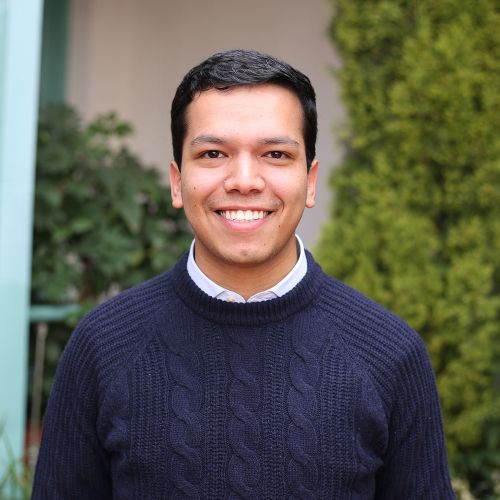
Sergio Andrés Rodríguez Yepes

Léa Paloma Córdoba Rodríguez
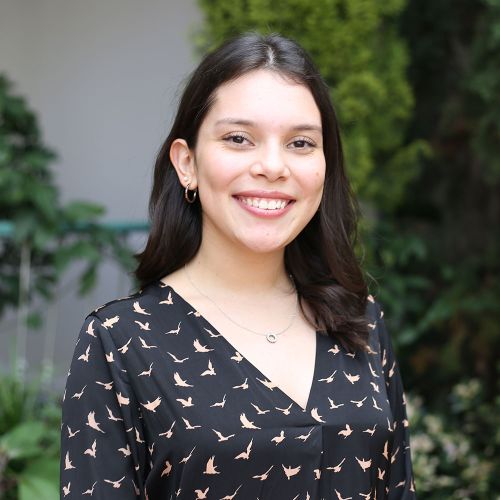
Alejandra Contreras Carrillo

Andrés Felipe Abella Tunjano

Cristina Echeverri Rozo
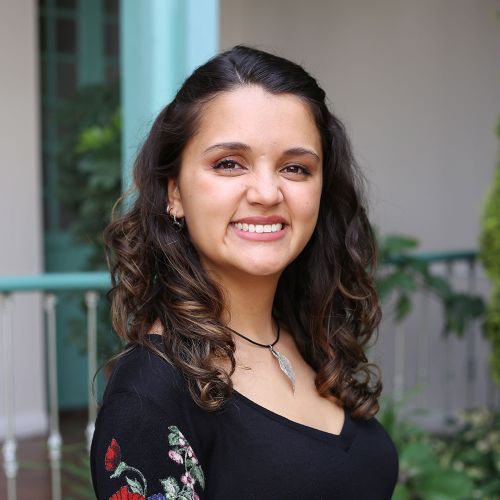
Diana Catalina Rivera Rodríguez

Gabriela Hernández Roca

Juan Salvador Vargas Díaz

Juana Valentina Rodríguez Sotelo

Matthew Berthier Ruíz

Natalia Carrillo Bustamante
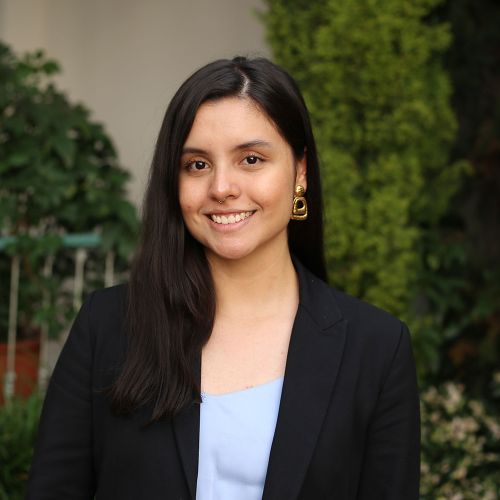
Paula Andrea Rojas Osorio
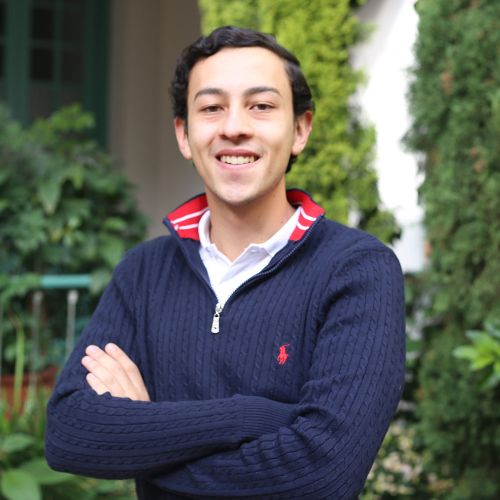
Tomás Restrepo Benalcazar

NATALIA SALAS GÓMEZ

MANUEL VELASCO DURÁN
Collegial council
COLLEGIAL COUNCIL
Collegians of Distinction: The Tradition of a Legacy

Collegians of Distinction: The Tradition Of A Legacy Being a Rosarista represents a set of qualities that have allowed us to stand out throughout history. We are one of the oldest universities in Colombia; we are autonomous, human, and critical of a society that needs someone to be. We elect our rector and our councilors, and we participate in the decisions that are made in an institution created by and for the students. We are the only university that has the right and duty to elect its institutional governing body; we represent that dose of rebelliousness that seems necessary in any established system. We are the result of a constant struggle kept alive by our founder: Friar Cristóbal de Torres. His strength, tenacity, and autonomy allowed us, and continue to allow us today, to be one of the most important educational institutions in Colombia and in Latin America.
Establishment of the Collegians: A Struggle Against Tradition
On December 18, 1653, the Archbishop of Santa Fe, Friar Cristóbal de Torres, founded the Colegio Mayor de Nuestra Señora del Rosario. This Spanish Dominican, renowned for his studies in Theology, his teaching vocation, and the reforming strength with which he lived, proposed to create an educational institution that differed from the two prominent ones in the New Kingdom of Granada: the Universidad Santo Tomás and the Pontificia Universidad Javeriana. His college soon became the most prestigious university in the New Kingdom.
In a departure from the norm, Friar Cristóbal established his college with the idea that fifteen students would be in charge of electing the rector. This decision led to conflicts with his Dominican peers, who, with the power that King Philip IV granted them, led many social and educational institutions of the time. They did not want the new college to be different.
It took several years of seeking permissions, agreements, conciliations, and courses of action so that Archbishop Friar Cristóbal’s model, inspired by institutions like the University of Bologna or the University of Salamanca, would be accepted within the established system of the time. Ten years later, King Philip IV ruled in favor of the Rosario. An archbishop, with his resources, had created a college directed, governed, and organized by its own students. The governance system was led by fifteen students who lived in the Cloister. They elected the rector and councilors at regular intervals, who would become the members of the board responsible for managing resources. Thus, the Colegio Mayor de Nuestra Señora del Rosario was established.
Similarly, our founder proposed that the patron of the institution should be the current archbishop leading the Church. When the archbishop changed, so would the patron of the Rosario. However, it was the king who was designated this role within the Cloister. The patron is a figure that exists to protect an institution, to assess if it is working well, and to provide help if necessary. This would change during the time of independence. During the founding of the Republic, the liberator Simón Bolívar proposed that all the patrons, previously headed by the king (and several institutions followed this model), would now be assumed by the President of the Republic, as this figure replaced the king. The President of the Republic thus became the patron of the Colegio Mayor de Nuestra Señora del Rosario.
Years later, the Universidad del Rosario continued to lead the country with its autonomy, academic excellence, and institutional dedication. Thus, the spirit and status of the Rosario began to set it apart from all other universities, allowing it to persist throughout the entire period of Spanish rule.
Collegians: A Crucial Role

Dr. Luis Enrique Nieto, Director of the Cultural and Historical Heritage Unit at the Universidad del Rosario, describes the Collegial Council as follows: “Collegians actively participate in university life. They elect the rector and the councilors. They have the responsibility of preserving a legacy and choosing their institutional government, something that does not happen in any other university in the country. Any achievement of the institution is, in part, the work of the Collegians”.
Collegians shoulder significant responsibility when taking on this role. They form a governing body with the authority to elect both the rector and the councilors. Additionally, since 2005, the Resident Assistant has been a part of the Board of Councilors, with both a voice and a vote. Today, and for several years now, collegians have actively participated in the Academic Councils of faculties and schools, as well as in many institutional committees, such as the Scholarship Committee. Over the years, collegians have increasingly made their presence felt in the academic bodies and units of the University.
The Collegial Council is a perfect example of student participation. It is worth highlighting the distinctive qualities of Collegians of Distinction, which embody the Rosarista hallmark: a sense of responsibility and great confidence in our youth.
Selection Process: Leadership and Conduct
In order to select Collegians of Distinction, each school and faculty prepares and publishes lists of students who rank within the top third in terms of academic performance and have completed at least four academic terms in their respective programs. These students must fill out the resume format so that their academic unit can pre-select a group of candidates to be interviewed by the respective academic council. Afterwards, they sit a psycho-technical test.
Once the interviews of the pre-selected students have taken place, the academic council of each faculty or school, with the presence of the rector or their delegate, the dean, representatives of the professors, alumni, the Student Council, and the Collegians themselves choose a specific number to proceed to the final interview with the Board of Councilors. The Board of Councilors, chaired by the rector, is responsible for selecting the fifteen Collegians, who must be confirmed by the President of the Republic in his capacity as the patron of the Cloister.
The fifteen students who currently constitute the Collegial Council, coming from various undergraduate programs, are selected based on their outstanding moral and behavioral qualities, as well as their exceptional leadership abilities.
El Rosario, with the Collegial Council body, demonstrates that it has always been and will continue to be an institution of and for the students. Brimming with ideas, autonomy, voice, and humanity, our students actively participate in shaping the University where they experience some of the best years of their lives. The University educates and instills them with a strong sense of service to the common good, with the Rosarista hallmark and values.
Requirements
REQUIREMENTS

While all undergraduate students may aspire to be Collegians, the Constitutions stipulate that to be a Collegian, applicants must:
Meet high moral and behavioral standards
Have completed at least two consecutive years of continuous study at the Universidad del Rosario
Rank in the top third of their course in terms of academic performance
Following a rigorous selection process conducted by the academic councils of the various faculties and schools, the Collegians required to fill the fifteen positions mandated by the university's governing body are chosen by the Rector and the Councilors together. The institution of the Collegial Council holds great significance in the university life of Rosarita students, as it is the students who govern the University, bringing forth fresh and innovative ideas, along with new goals to achieve. By becoming Collegians of Distinction, students receive an honor that will accompany them throughout their lives. After completing their undergraduate studies, they transition from Collegians of Distinction to simply Collegians, as this recognition is lifelong.
In addition, Collegians of Distinction enjoy a full scholarship for the remainder of the academic program for which they were selected, and receive additional benefits such as exemption from graduation fees and the opportunity to have a private graduation ceremony in the Main Hall of the University Cloister.
Responsibilities
RESPONSIBILITIES

It is important to highlight that the primary responsibility of these young Universidad del Rosario students is the election of the Rector and the Councilors. Collegians of Distinction, together with the Councilors, form the Electoral College of the Rector; and, in turn, the Collegians of Distinction and the Rector form the Electoral College of the Councilors.
Among the various roles and duties of Collegians of Distinction are:
To uphold the qualities and virtues for which they were chosen.
To maintain their academic excellence and responsibility.
To fulfill the oaths taken on the day of their consecration as Collegians.
To participate in the Academic Councils of each faculty.
To develop projects for the benefit of students and institutional strengthening.
To strengthen the Rosarista community.
To consolidate economic support and incentive policies.
Enhancing discussions and actions for the formation of a better: University and country.
Colegiales electos
COLEGIALES ELECTOS

ALEJANDRA CONTRERAS CARRILLO

ANDRÉS FELIPE ABELLA TUNJANO

CRISTINA ECHEVERRI ROZO

DIANA CATALINA RIVERA RODRÍGUEZ

GABRIELA HERNÁNDEZ ROCA

JUAN SALVADOR VARGAS DÍAZ

JUANA VALENTINA RODRÍGUEZ SOTELO

LEA PALOMA CÓRDOBA RODRÍGUEZ

MATTHEW BERTHIER RUÍZ

NATALIA CARRILLO BUSTAMANTE

PAULA ANDREA ROJAS OSORIO

SERGIO ANDRÉS RODRÍGUEZ YEPES

TOMÁS RESTREPO BENALCAZAR
Integrantes Colegiatura Actual
INTEGRANTES COLEGIATURA ACTUAL

Sergio Andrés Rodríguez Yepes

Léa Paloma Córdoba Rodríguez

Alejandra Contreras Carrillo

Andrés Felipe Abella Tunjano

Cristina Echeverri Rozo

Diana Catalina Rivera Rodríguez

Gabriela Hernández Roca

Juan Salvador Vargas Díaz

Juana Valentina Rodríguez Sotelo

Matthew Berthier Ruíz

Natalia Carrillo Bustamante

Paula Andrea Rojas Osorio

Tomás Restrepo Benalcazar

NATALIA SALAS GÓMEZ

